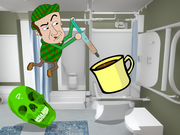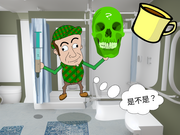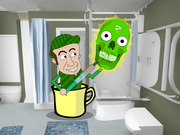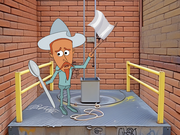to dare / daring / (polite) may I venture
敢
=
乛
+
攵
+
耳
:
Mnemonic symbol: 石敢当, stone tablet erected to ward off evil spirits.
Guy Fawkes erected a stone tablet to ward off evil spirits inside of the anthill, but as he was drinking at the bar he noticed how the stone tablet suddenly started moving all on its own and tried to cut off Guy's ear with a sickle. Consequently, Guy Fawkes takes a sledgehammer and destroys the stone tablet to be safe; he wouldn't dare to have another drink setting next to this weird tablet.
Guy Fawkes erected a stone tablet to ward off evil spirits inside of the anthill, but as he was drinking at the bar he noticed how the stone tablet suddenly started moving all on its own and tried to cut off Guy's ear with a sickle. Consequently, Guy Fawkes takes a sledgehammer and destroys the stone tablet to be safe; he wouldn't dare to have another drink setting next to this weird tablet.
to get rid of / to remove / to exclude / to eliminate / to wipe out / to divide / except / not including
to not be; not / wrong; incorrect / non-; un-; in-; de- / to reproach; to blame / (coll.) to insist on; simply must
非
=
三
+
丿
+
丨
:
Frankenstein's monster made an effort to photograph the Eiffel Tower, but now his negative is a big mess. In front of the tower her set up a camera on a Cartesian coordinate system as a tripod, and he attached a banana and a dinosaur bone to the camera so that he can finely tune the angles. All was for naught as he now holds the messed up negative in his hands.
to be (followed by substantives only) / correct; right; true / (respectful acknowledgement of a command) very well / (adverb for emphatic assertion)
是
=
旦
+
龰
:
Mnemonic symbol: a skull, from "to be or not to be".
Sherlock Holmes (sh) starts his day in the space station's bathroom (Ø4) with a mug of coffee (旦). Holding a skull (mnemonic symbol for 是) in his hands, he asks himself "to be, or not to be" (是). He wonders if he can make the skull come back to life using lots of coffee, and injects coffee from his mug into the skull using a syringe (龰).
Sherlock Holmes (sh) starts his day in the space station's bathroom (Ø4) with a mug of coffee (旦). Holding a skull (mnemonic symbol for 是) in his hands, he asks himself "to be, or not to be" (是). He wonders if he can make the skull come back to life using lots of coffee, and injects coffee from his mug into the skull using a syringe (龰).
是
=
日
+
下
+
人
:
Mnemonic symbol: a skull, from "to be or not to be".
Sherlock Holmes (sh) watches the Neanderthal Man (人) trying to climb to the sun (日) on a ladder (下) in the space station's bathroom (Ø4). Sherlock is afraid that he'll open the window, so he puts on a big skull (是) and scares him off.
Sherlock Holmes (sh) watches the Neanderthal Man (人) trying to climb to the sun (日) on a ladder (下) in the space station's bathroom (Ø4). Sherlock is afraid that he'll open the window, so he puts on a big skull (是) and scares him off.
of; ~'s (possessive particle) / (used after an attribute) / (used to form a nominal expression) / (used at the end of a declarative sentence for emphasis) / also pr. [di4] or [di5] in poetry and songs




